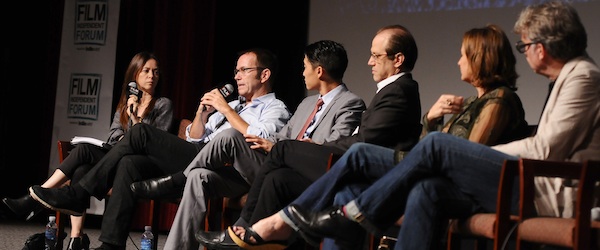Money Matters: A Financing Clinic at the Film Independent Forum

The Film Independent Forum, held in October at the DGA in Hollywood, hosted a panel this year about that eternal obstacle to indie filmmakers: financing. A panel of industry experts discussed current financing practices, then listened to two presentations by Film Independent Fellows about their current projects and gave them specific advice about how to market their films to investors.
Paula Manzanedo-Schmit, Vice President of Film Finances Inc., moderated the panel, which featured Brian O’Shea, CEO of The Exchange; Stuart Pollok, President of Film at Indomitable Entertainment; Peter Trinh, an agent in the International and Independent Film division at ICM Partners; Michele Turnure-Salleo, Director of the San Francisco Film Society’s Filmmaker360 program; and Gary Michael Walters, CEO of Bold Films. After a discussion amongst themselves, the panelists advised Fellows Summer Shelton, a producer working on a film called The Buried Life, and Dennis Bartok and Joanna Colbert, writer/director/producer and producer, respectively, on their film The Lord of Vinyl.
“There is very much the haves and the have-nots—more than there have ever been in the past,” O’Shea began, “but do not despair. Creativity is the great equalizer.” They all seemed to agree on that: “It’s a creative business,” Walters said, “and you can run the numbers, and they say the numbers don’t lie, but the numbers are fluid, so there’s a false comfort in the numbers. Our bet is on great artists.” He added that there are two criteria that demarcate the chasm between those “haves and have-nots:” access to equity financing, and the type of project. “Buyers are gravitating toward the larger-budget indie fare,” he explained.
Turnure-Salleo’s work with the SFFS Filmmaker360 program focuses more on grants and artist development than straight financing, and she said that she is more interested in artistry than commercial viability when looking for new projects and filmmakers. “We really encourage people to open your minds to what success is, and think about it beyond traditional parameters of money,” she said. “[Success] is not uniform; it can be different from filmmaker to filmmaker, it can be different from project to project.”
When presented with the two projects by Fellows, the experts knew exactly what to do right away. For The Lord of Vinyl, a music-themed movie, they agreed that an older star would be a problem, but the filmmakers should emphasize the music—especially with international sales. The Buried Life, which is not yet cast, has a twenty-something female protagonist. “There is a really simple answer,” Walters said. “Get a movie star.” Though that presents a bit of a chicken-and-egg problem, he explained: “A lot of agents have a ‘make an offer’ mentality, but if you don’t have the financing to make an offer without the actor, how do you get the actor?” He shrugged, “That is the art of the hustle of the young filmmaker.”
“It’s a pretty interesting time,” Trinh said. “Ten years ago, we would ask that a project had one item of value, like a director, or an actor, or a piece of equity, or something that we could sort of filter the mechanism. Today, I’ve found that we’re actually looking at things a lot earlier.” Trinh packages projects, bringing together talent and putting the pieces in place to make the film appealing to investors. “We’re sort of in-house producers, but we don’t get a producer credit,” he said. “We have to wear a suit—I have a huge dry cleaning bill. And you can’t expense it; I’ve tried. I’ve tried several times. Lunch is okay, dinner okay, drinks, yes. Dry cleaning? No.”
“We love to see a complete package, but we typically find when a package comes to us, it’s not quite where the market needs it to be,” Pollak admitted. “So we deconstruct the package a little bit; I look for a key idea or concept that I think we can market and sell. If I think there’s something a little bit magic in the core, [we might] take it even at script stage.” He advised against pitching a script without a director, however—“finding a director takes forever”—but for the right project that matches their financing model, just a screenplay and a director can be enough for him to consider it.
“When we get involved is probably the most hotly analyzed and debated topic inside Bold right now,” Walters said. The market is extremely competitive for complete packages, so they’ve started looking at projects one stage earlier, a role that needs an actor, or a script that needs a polish. “We have had our best success with fully packaged projects,” he said, “and those are the easiest to get into production. You just have to take it to a market, take those sales to the bank, toss in equity, go make your movie.” Just like that! “Well, it’s a little more complicated,” he admitted, to laughter from the audience, “but not much more complicated.”
Mary Sollosi / Film Independent Blogger